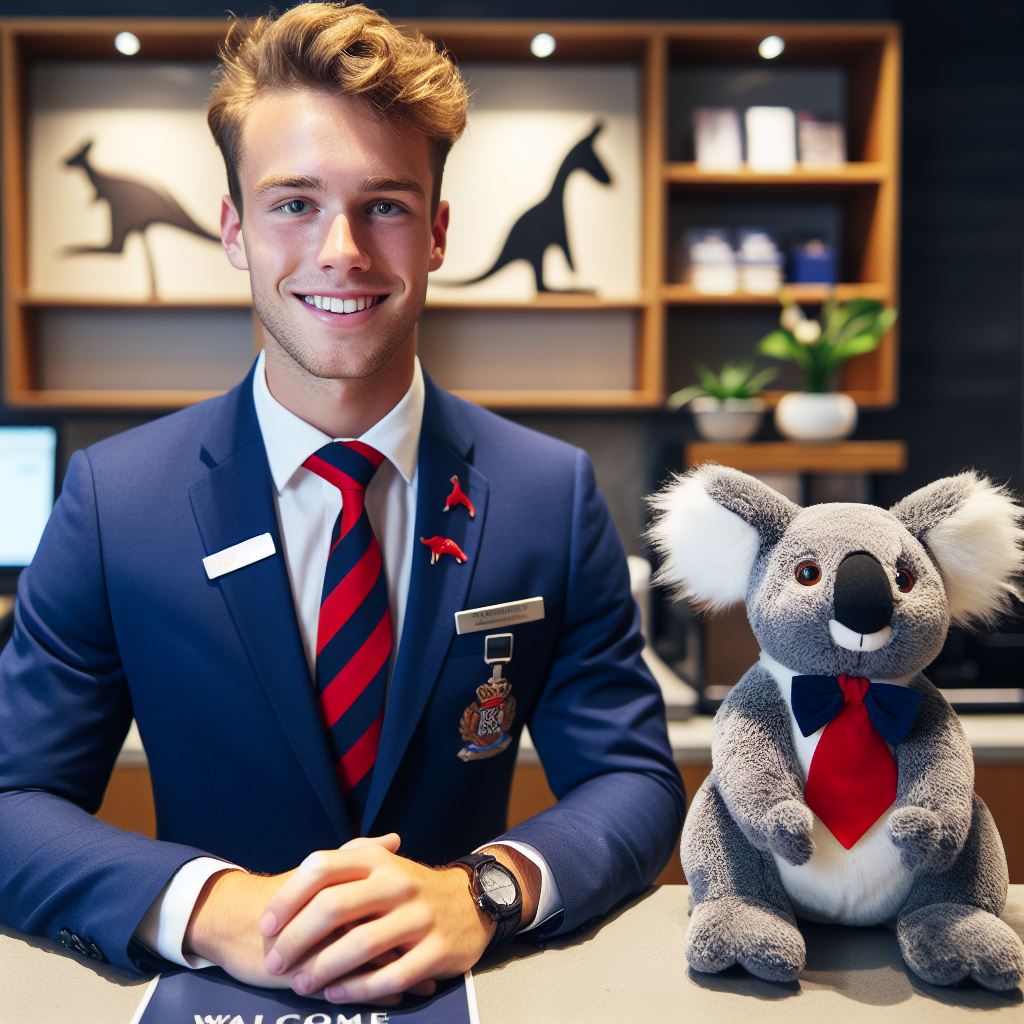Introduction
In this section, we will explore the daily life of an Aussie hotel manager and their responsibilities.
Overview of responsibilities and tasks
Aussie hotel managers are in charge of ensuring the smooth operation of the hotel on a daily basis. They oversee various departments and make important decisions to ensure guest satisfaction.
Each morning, the hotel manager starts by reviewing occupancy reports and checking for any VIP arrivals. They then coordinate with the front desk to ensure rooms are prepared to the highest standards.
Throughout the day, the manager handles guest complaints, resolves any issues, and ensures exceptional customer service. They also supervise staff performance and provide necessary training.
Another crucial responsibility is managing the budget and financial aspects of the hotel. This includes analyzing revenue reports, controlling expenses, and making strategic decisions to maximize profits.
Hotel managers also maintain relations with suppliers, negotiate contracts, and oversee inventory management. Additionally, they monitor competitor activities to stay ahead in the dynamic hospitality industry.
The manager may also participate in meetings with other department heads to discuss improvements, plan events, and coordinate marketing strategies.
At the end of the day, the hotel manager ensures all operations are running smoothly, reviews the daily financial reports, and prepares for the upcoming day’s activities.
In general, the role of an Aussie hotel manager is diverse and demanding. They play a vital role in ensuring the hotel’s success by overseeing various departments and providing exceptional guest experiences.
Responsibilities of an Aussie Hotel Manager
An Aussie hotel manager has a wide range of primary responsibilities that are crucial for the smooth functioning of the hotel and ensuring customer satisfaction.
Overseeing all hotel operations
- The hotel manager is responsible for overseeing all aspects of the hotel’s operations.
- This includes managing the front desk, housekeeping, maintenance, food and beverage, and other departments.
- They ensure that all operations run smoothly and efficiently, meeting the hotel’s standards and goals.
Managing staff
- Effective leadership and management skills are vital for an Aussie hotel manager.
- They are responsible for hiring, training, and supervising the hotel staff.
- They ensure that all employees are well-equipped with the necessary skills and knowledge to perform their duties.
Ensuring customer satisfaction
- A key responsibility of a hotel manager is to ensure a high level of customer satisfaction.
- They strive to exceed guest expectations by providing exceptional service and resolving any issues promptly.
- They handle guest complaints, feedback, and ensure a pleasant experience for all guests.
Importance of effective leadership and decision-making skills
Being an effective leader and having strong decision-making skills are crucial for an Aussie hotel manager. Here’s why:
Leading by example
A hotel manager sets the tone for the entire staff. By leading by example, they motivate employees to perform their best and provide excellent service to guests.
Delegating tasks
An effective leader knows how to delegate tasks efficiently. This ensures that all hotel operations are properly managed and no area is neglected.
Problem-solving
Quick decision-making and problem-solving skills are essential in the hospitality industry. Hotel managers must address issues promptly and find effective solutions.
Maximizing profitability
Hotel managers make crucial decisions that impact the hotel’s profitability. They analyze financial data, control costs, and implement strategies to maximize revenue.
Your Personalized Career Strategy
Unlock your potential with tailored career consulting. Get clear, actionable steps designed for your success. Start now!
Get StartedEnhancing the guest experience
By making informed decisions, hotel managers can enhance the overall guest experience. They introduce new services, amenities, and ensure a comfortable stay for guests.
Crisis management
During challenging situations, such as natural disasters or emergencies, hotel managers play a vital role in managing the crisis and ensuring the safety of guests and staff.
In essence, an Aussie hotel manager holds primary responsibilities like overseeing operations, managing staff, and ensuring customer satisfaction.
Effective leadership and decision-making skills are crucial for success in this role, leading to a well-functioning hotel and happy guests.
Read: Travel Agents: Trends in Australia for 2024
Morning Routine
As an Australian hotel manager, my morning routine is a strategic blend of tasks aimed at ensuring a productive day. Beginning with checking urgent emails, I promptly address any overnight issues. Reviewing occupancy reports helps me allocate resources effectively based on guest numbers.
A comprehensive walkthrough of the hotel follows, guaranteeing everything is in order for a comfortable guest experience. Team meetings are crucial for collaboration, where tasks are delegated to ensure operational smoothness.
Preparation for the day’s meetings involves reviewing documents and gathering essential data. Ongoing communication with departments like housekeeping ensures immediate concerns are addressed.
Beyond operational tasks, I prioritize guest satisfaction by personally attending to their needs and concerns. Being present and open to feedback sets a positive example for my team.
By the end of this routine, I am confident and well-prepared to tackle the day’s challenges, equipped with a solid foundation for efficient hotel management. In essence, the morning routine strikes a harmonious balance between administrative duties, team collaboration, and guest satisfaction, setting the tone for success in the hospitality industry.
Read: How to Become a Travel Agent in Australia
Guest Relations
The importance of guest relations in a hotel manager’s role
The role of guest relations is of utmost importance in the daily life of an Aussie hotel manager. It involves managing and maintaining positive relationships with guests, ensuring their needs are met, and ultimately guaranteeing their satisfaction.
How hotel managers handle guest complaints and ensure overall customer satisfaction
Hotel managers handle guest complaints by taking them seriously and addressing them promptly. They understand that unresolved complaints can harm the hotel’s reputation and lead to negative reviews.
Examples of customer service strategies employed by Aussie hotel managers
To ensure overall customer satisfaction, hotel managers engage in active communication with guests. They make an effort to listen attentively, empathize with any concerns, and provide effective solutions.
Stand Out with a Resume That Gets Results
Your career is worth more than a generic template. Let us craft a resume and cover letter that showcase your unique strengths and help you secure that dream job.
Get Hired- One customer service strategy employed by Aussie hotel managers is personalized attention. They strive to make guests feel special by remembering their preferences and anticipating their needs.
- Aussie hotel managers also focus on efficient problem-solving. They quickly resolve any issues or inconveniences faced by guests, ensuring a smooth and hassle-free experience.
- Another customer service strategy is providing a warm and welcoming atmosphere. Hotel managers train their staff to be friendly, approachable, and attentive to all guests’ needs.
Hotel managers understand that creating exceptional experiences for guests can lead to repeat business and positive word-of-mouth recommendations.
They prioritize training their staff to deliver excellent customer service, emphasizing the importance of being polite, courteous, and professional at all times.
Aussie hotel managers also rely on regular guest feedback to enhance the quality of their services. They actively encourage guests to share their opinions and suggestions.
- Some hotel managers offer loyalty programs to show appreciation for frequent guests. These programs often include perks such as free upgrades, exclusive discounts, and personalized benefits.
- Another effective strategy is the provision of complimentary amenities or services. This can include welcome drinks, free Wi-Fi, or access to fitness facilities.
- Hotel managers often organize special events or activities to enhance guest experiences. These can range from wine tastings and cooking classes to guided city tours.
In fact, guest relations play a vital role in the daily responsibilities of Aussie hotel managers. By handling guest complaints effectively, utilizing customer service strategies, and prioritizing customer satisfaction, they establish strong relationships and ensure positive hotel experiences.
Read: Travel Agents: The Future in Aussie Tourism

Staff Management
The responsibilities associated with managing hotel staff
Managing hotel staff comes with a variety of responsibilities. As a hotel manager, it is essential to ensure that the staff is well-trained, motivated, and working efficiently to maintain guest satisfaction.
Here are the primary responsibilities associated with managing hotel staff:
Scheduling
Creating and managing staff schedules is a critical task for hotel managers. They must ensure that all shifts are adequately staffed, taking into account peak and off-peak periods. Proper scheduling helps maintain a smooth operation and avoids understaffing or overstaffing issues.
Training
Hotel managers are responsible for training new employees and providing ongoing training to the existing staff. Training should focus on developing employee skills, improving service quality, and enhancing guest experience.
Regular training sessions ensure that staff members stay updated with industry trends and best practices.
Performance Evaluations
Conducting performance evaluations is crucial to monitor staff members’ progress and identify areas for improvement. Hotel managers assess employees based on their job performance, customer service, teamwork, and adherence to policies and procedures.
Constructive feedback is provided to encourage growth and enhance employee motivation.
Fostering a Positive Work Environment
Creating a positive work environment is vital for employee satisfaction and retention. Hotel managers should encourage open communication, teamwork, and mutual respect among staff members.
Recognizing and appreciating their efforts boosts morale and motivates them to deliver exceptional service.
Transform Your LinkedIn for Maximum Impact
Elevate your professional brand with a LinkedIn profile that attracts recruiters, showcases your expertise, and maximizes opportunities. Stand out in your industry with a profile built for success.
Boost ProfileDealing with Staffing Issues
Staffing issues can arise from time to time, and it is the responsibility of the hotel manager to handle them efficiently. Whether it’s resolving conflicts, addressing employee complaints, or managing disciplinary actions, a manager must tackle these issues promptly and fairly.
Open-door policies and transparent processes contribute to resolving conflicts and maintaining a harmonious work atmosphere.
Information on fostering a positive work environment and dealing with staffing issues
In order to excel in staff management, hotel managers can implement the following strategies:
Effective Communication
Maintaining clear and open lines of communication with the staff is crucial. Regular staff meetings, one-on-one sessions, and feedback mechanisms help in addressing concerns, providing guidance, and promoting a sense of belonging.
Leadership by Example
Leading by example sets the tone for the entire team. Hotel managers should display professionalism, dedication, and a strong work ethic, motivating staff members to follow suit.
Empowerment
Empowering staff members by delegating responsibilities and involving them in decision-making processes fosters a sense of ownership and boosts their confidence and job satisfaction.
Recognition and Rewards
Recognizing and rewarding outstanding performance reinforces positive behavior and creates a culture of excellence. Whether it’s through employee of the month programs, bonuses, or public appreciation, acknowledgment motivates employees to strive for success.
Continuous Professional Development
Encouraging staff to pursue additional training and professional development opportunities not only enhances their skills but also demonstrates the hotel’s commitment to employee growth and career advancement.
In fact, managing hotel staff is a multifaceted responsibility that requires effective scheduling, training, performance evaluations, fostering a positive work environment, and handling staffing issues efficiently.
By implementing strategies like effective communication, leading by example, empowerment, recognition, and continuous professional development, hotel managers can create a motivated and dedicated staff that delivers exceptional service and ensures guest satisfaction.
Read: Salary Guide: Travel Agents in Australia
Operations and Administration
The important administrative tasks that an Aussie hotel manager oversees
As an Aussie hotel manager, I oversee numerous important administrative tasks to ensure smooth operations of the hotel. From budgeting and purchasing to inventory control, I play a crucial role in maintaining the hotel’s standards and ensuring compliance with regulations.
Areas like budgeting, purchasing, and inventory control
- Budgeting: One of the key responsibilities of a hotel manager is to develop and manage the hotel’s budget. This involves analyzing past financial records, forecasting future expenses, and allocating funds to different departments and projects.
- Purchasing: In order to provide a seamless experience for our guests, I oversee the purchasing of various supplies and equipment required in day-to-day operations. This includes everything from toiletries and linens to kitchen appliances and furniture.
- Inventory Control: To avoid shortages or wastage, it is crucial to maintain proper inventory control. I work closely with the procurement team to ensure that stock levels are monitored, orders are placed in a timely manner, and inventory is tracked accurately.
The role of a hotel manager in maintaining the hotel’s standards and ensuring compliance with regulations
- Maintaining Standards: As a hotel manager, I am responsible for upholding the hotel’s standards to provide exceptional service to our guests. This involves overseeing the cleanliness, maintenance, and appearance of the hotel’s facilities, rooms, and public areas.
- Ensuring Compliance: Operating a hotel involves adhering to numerous regulations and standards set by local authorities and governing bodies. It is my duty to ensure the hotel complies with these regulations in areas such as safety, hygiene, licensing, and environmental standards.
- Staff Management: Managing a diverse team of hotel staff is another vital aspect of my role. I am involved in recruitment, training, and performance evaluations to ensure that the right personnel are in place to deliver top-notch service to our guests.
- Guest Relations: Building and maintaining positive relationships with our guests is of utmost importance. I strive to create a welcoming environment by addressing guest concerns, resolving complaints, and ensuring their overall satisfaction during their stay.
- Marketing and Sales: To attract guests and maximize revenue, I collaborate with the marketing and sales teams to develop effective strategies. This involves analyzing market trends, pricing rooms appropriately, and implementing promotional campaigns.
- Event Management: Hotels often host various events such as conferences, weddings, and parties. I work closely with the event management team to ensure smooth execution, providing necessary resources and support to make each event successful.
- Community Engagement: Being an active member of the local community is important for the hotel’s reputation. I participate in community events and engage with local organizations to foster positive relationships and contribute to the community’s well-being.
Continuous Improvement
I am committed to continuously improving the hotel’s operations and services. This entails seeking feedback from guests, analyzing performance data, and implementing changes or new initiatives to enhance guest experiences.
Managing Crisis
In the event of emergencies or crises, I am responsible for implementing appropriate protocols to ensure the safety and well-being of guests and staff members. This includes coordinating with relevant authorities and communicating effectively with stakeholders.
In fact, the role of an Aussie hotel manager encompasses a wide range of administrative tasks.
From budgeting and purchasing to maintaining standards and ensuring compliance with regulations, it is a demanding yet rewarding profession that requires effective multitasking and leadership skills.
You Might Also Like: Navigating Language Barriers in Tours
Meetings and Collaborations
In the fast-paced world of hospitality, the life of an Aussie hotel manager is filled with countless meetings and collaborations. These interactions are crucial for the smooth operation of the hotel and the achievement of its organizational goals.
Interactions with Other Departments
As an Aussie hotel manager, I constantly collaborate with various departments to ensure the seamless functioning of the establishment. Here’s a glimpse into my daily interactions:
Housekeeping
The housekeeping department plays a vital role in maintaining cleanliness and orderliness throughout the hotel. I frequently meet with the housekeeping manager to discuss room occupancy, linen supplies, and any special requests from guests.
In these meetings, we coordinate strategies to efficiently allocate resources and address any potential challenges. Effective communication with the housekeeping team ensures that rooms are prepared for check-ins and cleaned promptly after guests check out.
Front Office
The front office department serves as the face of the hotel, managing guest check-ins, reservations, and inquiries. Collaborating with the front office team is crucial to maintaining excellent customer service.
I regularly meet with the front office manager to discuss occupancy rates, guest feedback, and any issues that require attention. Through these collaborations, we ensure that guests feel welcomed and have a smooth and pleasant stay at our hotel.
Food and Beverage
The food and beverage department is responsible for providing exceptional dining experiences to our guests. Close collaboration with the food and beverage manager is necessary to deliver high-quality meals, drinks, and catering services.
Regular meetings allow us to discuss menu planning, special promotions, and any specific dietary requirements or preferences of our guests. By working together, we can ensure that our guests enjoy delicious meals and memorable culinary experiences.
The Importance of Effective Communication and Teamwork
Effective communication and teamwork form the bedrock of a successful hotel operation. Without open lines of communication and a collaborative spirit, achieving organizational goals would be nearly impossible.
By collaborating with various departments, we create a cohesive team that works towards a common objective: creating exceptional guest experiences.
Transparent and timely communication ensures that everyone is on the same page, making it easier to address any challenges that arise.
Through regular meetings, we can exchange ideas, share updates, and provide feedback to enhance operational efficiency. This collaborative approach fosters a sense of camaraderie among team members and encourages everyone to contribute their best efforts.
Furthermore, effective teamwork enables us to leverage the diverse skills and knowledge of each department. By pooling our strengths, we can innovate and implement strategies that enhance guest satisfaction, boost revenue, and drive the overall success of the hotel.
In summary, meetings and collaborations are an integral part of an Aussie hotel manager’s daily life.
From working closely with the housekeeping, front office, and food and beverage departments to fostering effective communication and teamwork, these interactions are vital for achieving organizational goals and providing exceptional guest experiences.
Uncover the Details: Culinary Schools in Aus: A Comprehensive Guide
Challenges and Rewards
Challenges Faced by Aussie Hotel Managers
- Dealing with difficult guests can be a major challenge for Aussie hotel managers.
- They have to ensure that each guest’s needs and expectations are met.
- Managing tight budgets is another obstacle that hotel managers face on a daily basis.
- They must find ways to cut costs without compromising the quality of service.
- Maintaining staff morale is crucial for a harmonious work environment.
- Hotel managers need to provide support and motivation to their team.
Emphasizing the Rewards
- Creating memorable experiences for guests is one of the most rewarding aspects of the job.
- Hotel managers have the opportunity to make a positive impact on their guests’ lives.
- Witnessing the growth and success of the hotel is another rewarding aspect of the job.
- Seeing the results of their hard work and dedication is a great source of satisfaction.
- Being in a position of leadership and guiding a team towards success is fulfilling.
Being an Aussie hotel manager comes with its fair share of challenges, but it is also a rewarding job.
While dealing with difficult guests, managing tight budgets, and maintaining staff morale can be demanding, the opportunity to create memorable experiences for guests and witness the growth of the hotel makes it all worthwhile.
It is a role that requires strong leadership skills, problem-solving abilities, and a genuine passion for the hospitality industry. Despite the challenges, hotel managers play a vital role in providing exceptional service and making a positive impact on their guests’ experiences.
Conclusion
In closing, the role of an Aussie hotel manager is vital in the hospitality industry. They must be skilled in customer service, organizational management, and problem-solving.
The manager’s responsibilities include ensuring guest satisfaction, maintaining high standards, and overseeing the smooth operation of the hotel.
Their role is crucial in providing a positive guest experience and ensuring the success of the hotel. If you are passionate about hospitality, a career in hotel management can be rewarding.
It offers opportunities for growth and development. To learn more about pursuing a career in hotel management, you can visit websites such as the Australian Federation of Travel Agents or the Australian Hotels Association.
These resources provide valuable information and guidance on qualifications, training courses, and job opportunities in the hotel industry. Consider a career in hotel management and be a part of creating memorable experiences for guests from around the world.




